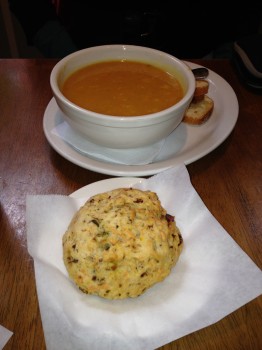We’ve all heard that eating “keeps body and soul together.” Evidence now suggests that our spiritual lives impact our relationship with food, and that the foods we eat can affect our spiritual sensibilities.
Dine like a yogi
The ancient seers who developed yoga may have been the world’s first nutritionists. They looked for a diet that could contribute to health of body and peace and mind, and determined that aged, stale, overcooked foods led to lethargy and laziness, while caffeine, hot spices, and even an excess of animal protein created a level of stimulation that was antagonistic to spiritual pursuits.
They suggested instead a diet comprised primarily of fresh vegetables, whole grains, fruits, beans, nuts, seeds and “milk from healthy cows.” This is surprisingly close to today’s cutting-edge nutritional recommendations that call for eating five to ten servings daily of fresh fruits and vegetables, consuming grains in their minimally refined state (oatmeal, 100% whole-wheat bread and brown rice), and several times a week choosing plant sources of protein (garbanzos, lentils and soy products, such as edamame and tofu).
Moderation and mindfulness
Add a yogic exercise program to your yogic diet, and you may find yourself eating more moderately. Researchers at the Fred Hutchinson Cancer Research Center in Seattle found that “mindful eating” is one of yoga’s welcome side effects. The study showed that students’ awareness of both why they were eating and when they’d had enough led to less weight gain over time, independent of calories burned doing yoga.
Head researcher Alan Kristal, Dr.P.H., of the University of Washington School of Public Health says, “This ability to be calm and observant during physical discomfort [i.e., maintaining a difficult yoga posture] teaches how to maintain calm in other challenging situations, such as not eating more, even when the food tastes good and when you’re not hungry.”
For yogis and the rest of us, selecting fresh, colorful, whole foods may well improve both physical and spiritual health. “To best perceive and receive the Holy Spirit in us, it is important for our body, mind and soul to be as translucent and peaceful as possible,” says theologian Norris Chumley, Ph.D., author of The Joy of Weight Loss: A Spiritual Guide to Easy Fitness. “Choosing foods that are alive, full of energy, and harvested in a peaceful way nurtures our entire being. We feel fully alive, energetic and peaceful from eating in a healthy, conscious way.”
Invite your soul to dinner

Even in our busy lives, there are some easy ways to make mealtime a nourishing experience on every level. Try these:
- Mindful food preparation. The Sikh tradition suggests that the cook pause for a moment at the kitchen door to be sure she (or he) is in a calm frame of mind and “worthy” of the sacred task at hand. If one’s spiritual state isn’t up to par, the recommendation is to spend a few minutes in prayer or taking a meditative walk, and then fixing the meal.
- Honor your body with the foods you select. “I believe that food is a gift of grace from God, just like life,” says Dr. Chumley.“ As we want to live the best life, choosing the very best food supports and sustains this sacred gift.” Beef up the healthy-grocery budget by eliminating snack foods and eating on the run. Keep expenses down by selecting seasonal produce and centering meals around health-supporting, low-cost staples, such as brown rice, red beans, split peas, carrots, yams, greens, apples, citrus, and bananas.
- Base your diet on fresh, natural foods. “Eating is an agricultural act,” says social critic Wendell Barry. Get a visceral understanding of what this means by growing a garden—or even a tomato plant on the balcony, or sunflower sprouts on the kitchen counter. Shop at farmers’ markets and talk to the people who work the land. Join a CSA (Community Supported Agriculture) where you purchase a share in a small local farm for the season.
- Grace at mealtimes. A prayer, or a moment of silence before eating, calms the mind and gets you ready to enjoy a relaxed lunch or dinner. This leads to eating more slowly and feeling more satisfied.
Fit from Within:
 If food is often too much of a good thing in your life, drawing on your spiritual connection can mean even more. An article in Alcoholism Treatment Quarterly stated, “Those with smoking, alcohol, and eating addictions who have been trained in meditation break their addictions with significantly lower relapse rates than those receiving standard therapies.”
If food is often too much of a good thing in your life, drawing on your spiritual connection can mean even more. An article in Alcoholism Treatment Quarterly stated, “Those with smoking, alcohol, and eating addictions who have been trained in meditation break their addictions with significantly lower relapse rates than those receiving standard therapies.”
It makes sense, then, that Overeaters Anonymous bases its program on the Twelve Steps, originally developed by AA. These famous steps are simply a nondenominational, spiritual action plan that includes turning things “over to the care of God, as we understood Him,” helping others, and practicing prayer and meditation.
Cravings can sometimes be stopped in their tracks with a few minutes of quiet contemplation, or by writing a gratitude list, e.g., I’m grateful for (1) my dog, (2) easy traffic this morning, (3) the fabulous book I’m reading…. We can also take the focus off ourselves (and the candy machine) by doing a good turn for another person.
When it is time to eat, enjoy without overdoing. See every meal as a tiny celebration. Put your morning o.j. in a wine glass. Take lunch to the park instead of staying at your desk. And for dinner: pull out the stops! Use the good dishes more often (what are you saving them for?), and put flowers on the table whenever your roses are in bloom or daisies are $3 at the deli.
Keep the conversation light, and if you’re dining by yourself, take the opportunity to focus on the tastes and textures of the food—it’s a very different experience from “inhaling” a meal before you rush to your next commitment. Alone or in company, put your fork down between bites. And say, “This is really good!” whenever the spirit moves you.
Try This! If knowing when to stop is sometimes a problem, end your meal with a prayer. You might adapt the words Catholic priests use to close the Mass (“The Mass is ended: go in peace”) to “The meal is ended: I go in peace.”


Absolutely lovely! Speaks to me specifically today.
Russell
A beautifully written content rich article, thank you Victoria.